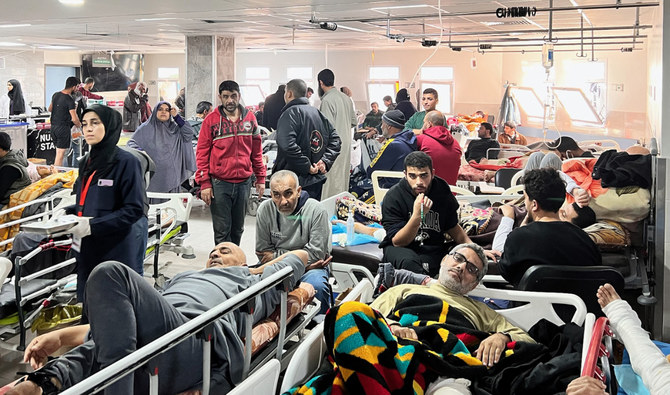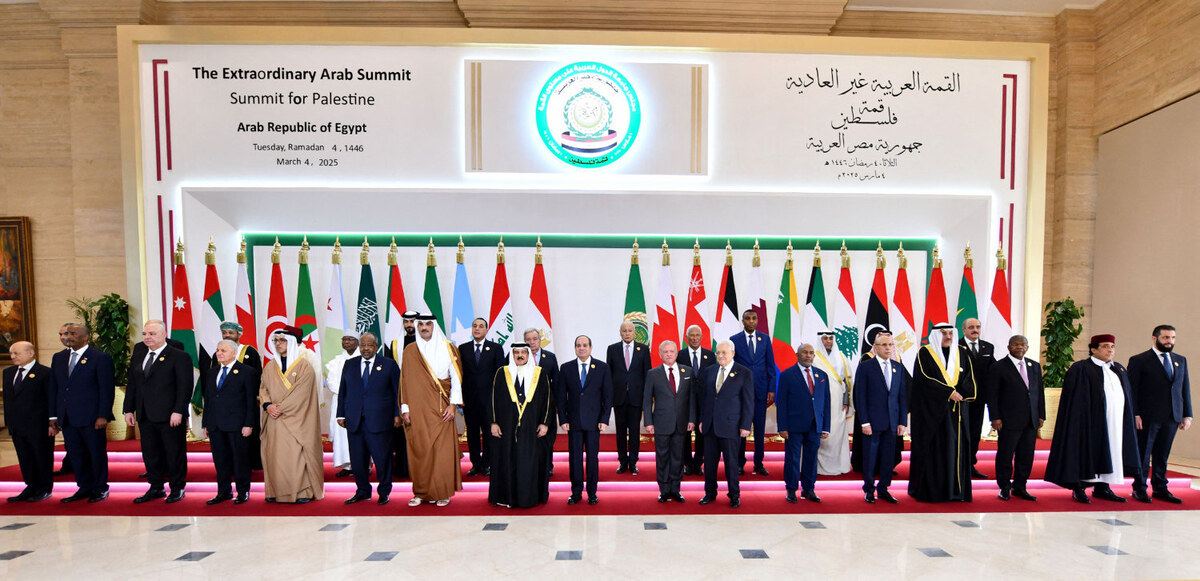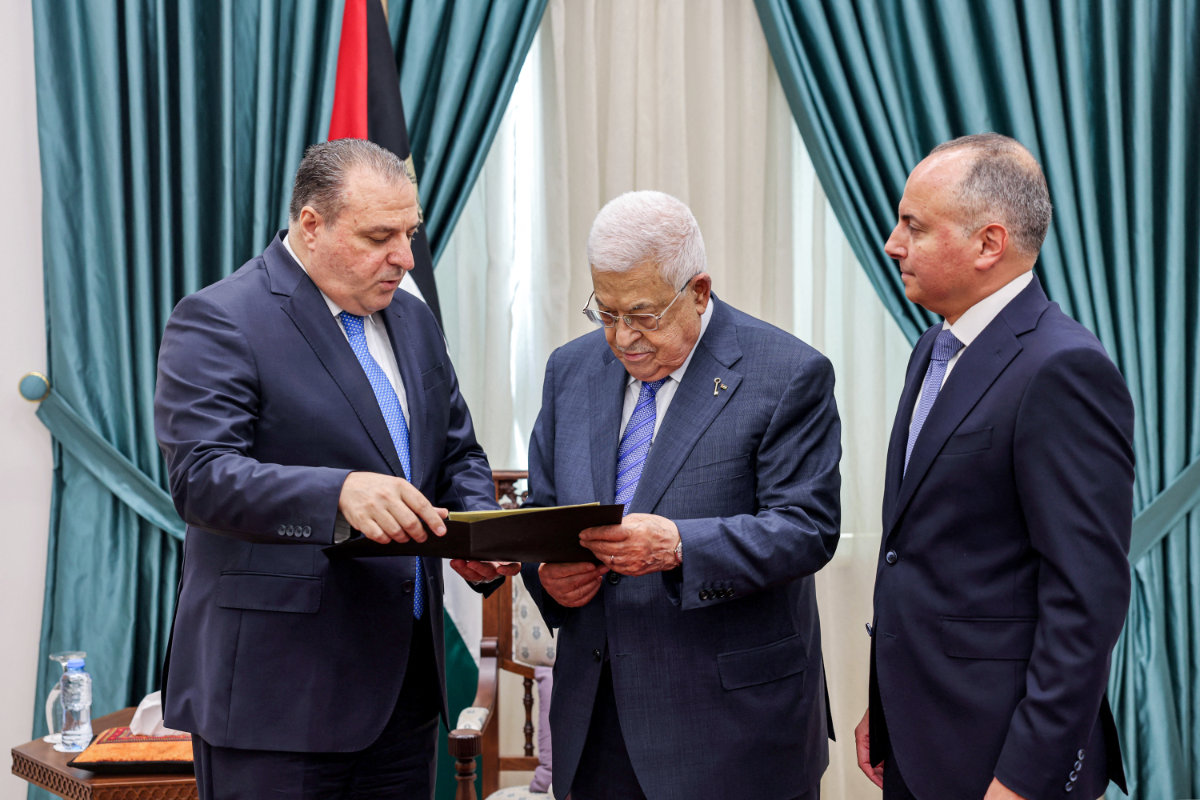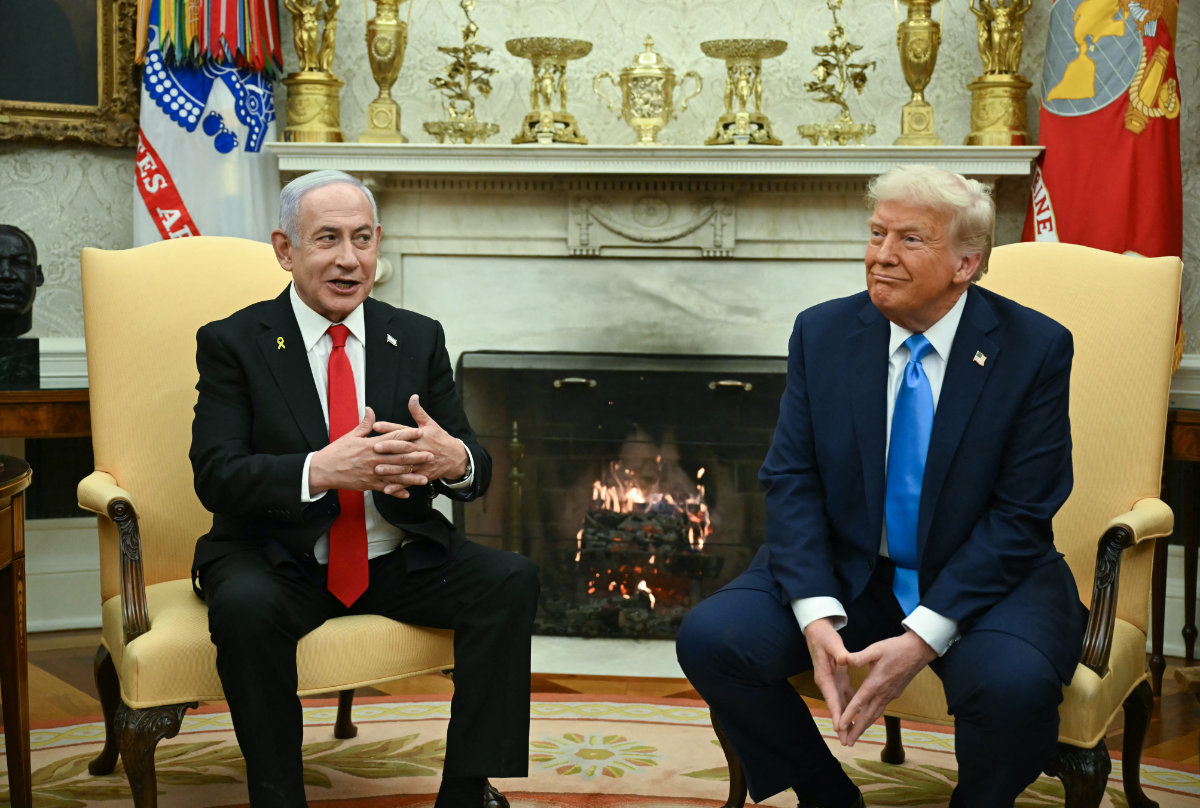DUBAI: Children lie in rows on hospital floors and on pavements outside crowded clinics as they await the attention of sleep-deprived medics. Many are caked in dust, congealed with blood and tears, their untreated wounds growing septic the longer they wait.
Among them, men and women search frantically for missing loved ones or plead with doctors for medical attention, while mothers cradle dying infants. With supplies of gauze now scarce, many are bandaged in a patchwork of whatever fabric is available.
Deprived of antiseptics and even clean water, doctors are forced to perform operations and amputations without sterilized equipment, leading to infections for which there are no antibiotics. These often take place without anesthetic or pain relief.
Such hellish scenes are playing out at the few remaining hospitals and clinics across the Gaza Strip, which has endured months of bombardment and effective siege since Israel launched its retaliation for the Hamas-led attack of Oct. 7.

Palestinian children suffering from malnutrition receive treatment at a healthcare center in Rafah in the southern Gaza Strip on March 5, 2024. (AFP)
“There are still patients and casualties who are scheduled for operations that cannot be performed because there are no supplies, no anesthetic drugs, no generators in these hospitals,” Hisham Mhanna, a spokesperson for the International Committee of the Red Cross based in Rafah, told Arab News.
“It’s a mess. It’s a catastrophe.”
This, at a time when doctors and nurses have themselves fled, been wounded or even killed amid the bombardment. According to the World Health Organization, just 30 percent of Gaza’s medics are still working — many of them stretched to breaking point.
“They deal with the resulting casualties that are coming into the emergency rooms after airstrikes,” said Mhanna. “This is in addition to the hundreds of thousands of patients and vulnerable groups, including cancer patients, people with disabilities, pregnant women and people with chronic diseases.”

A Palestinian woman comforts her children as they wait at the hospital to be checked in the city of Rafah, in the southern Gaza Strip on October 12, 2023. (AFP)
According to Hamas-run Gaza’s Ministry of Health, some 30,900 Palestinians have been killed, 70,500 injured, and 7,000 have gone missing since the violence began. Faced with such carnage, the local health system is buckling.
On Feb. 18, the WHO said Nasser Hospital in Khan Younis, the largest city in southern Gaza, where fighting is ongoing, was no longer functional.
“The European Gaza Hospital is the only hospital that’s functional and can provide advanced healthcare services such as surgeries, intensive care and X-rays,” Jessica Moussan, a spokesperson for the International Committee of the Red Cross based in Dubai, told Arab News.
“There are a few other hospitals partially functioning that have been provided a few supplies.”

A picture shows the damage in Nasser Hospital and the surrounding area in Khan Yunis in the southern Gaza Strip on February 26, 2024. (AFP)
At the end of January, the ICRC said: “Gaza is at risk of complete medical shutdown without urgent action to preserve services.”
In a statement, William Schomburg, head of the ICRC office in Gaza, said: “Every hospital in the Gaza Strip is overcrowded and short on medical supplies, fuel, food and water.
“Many are housing thousands of displaced families. And now two more facilities risk being lost due to the fighting. The cumulative impact on the health system is devastating and urgent action must be taken.”
INNUMBERS
30,900 Palestinians killed in Gaza since Oct. 7, according to local health officials.
1.3% Proportion of Gaza’s prewar population of 2.3m killed in the conflict.
70,500 People registered as injured, although the true figure is likely far higher.
Just nine of Gaza’s 36 health facilities are still functioning, many only partially, and all at many times their intended capacity. The crowding is made worse by displaced families camped out on hospital grounds, believing they are safe there from the Israeli bombardment.
“The few remaining hospitals that are still functioning struggle on a daily basis with large numbers of casualties in addition to the pressure resulting from the thousands of families who are internally displaced at the hospitals,” said Mhanna.

Palestinians run for cover next to covered bodies after an Israeli airstrike near the Kamal Adwan hospital in Beit Lahia in the northern Gaza Strip on November 22, 2023. (AFP)
The displacement of some 85 percent of Gaza’s 2.3 million inhabitants to densely packed refugee camps has left the population — especially young children — vulnerable to waterborne diseases, placing further pressure on health services.
There are also the cases generated by the spread of disease during the war, added Mhanna.
“At certain points sewage was flooding into the hospitals. There is also no personal space, and people cannot afford to buy food,” he said.
“They would rather buy food than hygiene items and without hygiene items you create the perfect storm for a public health crisis filled with waterborne diseases like cholera, hepatitis, chicken pox and influenza, because it is also cold here.”
Then there are those suffering with chronic conditions such as heart disease, diabetes and cancer, who have been unable to access routine treatments and therapies since the onset of the crisis, not to mention those in need of physiotherapy and mental health support.

Children injured in an Israeli strike are rushed to the Al-Shifa hospital in Gaza City on October 15, 2023. (AFP)
Among the most vulnerable are pregnant women and newborns, who lack access to midwives, surgeons and incubators, as well as pain relief and antiseptics, making complications even more likely.
Critics say the vast destruction is evidence that Israel’s attacks are disproportionate and fail to limit civilian casualties. “Hospitals, intended to be safe havens … have frequently turned into death traps,” the Israeli watchdog Physicians for Human Rights said in a report published in February.
The Israeli government says its military does not target civilians or hospitals and blames Hamas for conducting military operations and launching rockets from crowded residential areas.
Israeli officials have also disputed claims of a mounting hunger crisis in Gaza. One official, recently cited by Bloomberg, said “there is not a shortage of food or water in the Gaza Strip at the moment,” and “it’s just not true that starvation is looming.”
Aid agencies say the limit on the amount of humanitarian relief permitted to enter Gaza by the Israeli military has caused widespread malnutrition, which doctors lack the resources to treat.
Despite repeated warnings by aid agencies about an impending famine, several Gazans have reportedly starved to death.

Aid agencies say the limit on the amount of humanitarian relief permitted to enter Gaza by the Israeli military has caused widespread malnutrition. (AFP)
In northern Gaza, where 300,000 people are thought to remain, around 16 percent of children under the age of two were acutely malnourished as of January, according to the UN. The organization has cited an “unprecedented” rate of decline in the nutritional status of Gazans.
Aid groups operating in Gaza say it has become almost impossible to deliver supplies due to inspections and procedural red tape put in place by the Israeli military, the ongoing fighting, and the complete breakdown of public order.
Even when aid is delivered, crowds of desperate Palestinians quickly overwhelm convoys before relief can be distributed and rationed to the neediest. Such crowds have resulted in crushes, causing further death and injury.
One such incident on Feb. 29, in which more than 100 Palestinians who rushed an aid convoy were killed — many apparently shot dead by Israeli forces — prompted the US to airdrop 38,000 meals into the enclave on March 2.

A man mourns at Al-Shifa hospital in Gaza City, over the bodies of Palestinians killed in an early morning incident when residents rushed toward aid trucks, on February 29, 2024. (AFP)
In a statement on Monday, State Department spokesperson Matthew Miller said the US was working to increase the delivery of humanitarian aid to civilians in Gaza “through as many channels as possible,” including more airdrops because “the situation is simply intolerable.”
“People are desperate for food and water,” said Miller. “Parents are facing impossible choices about how to feed their children. Many don’t know where the next meal will come from, or if it will come at all.”
Although the airdrops offer desperately needed relief, Mhanna said many of the parachuted crates landed in dangerous places where they were often mobbed by desperate crowds, causing accidents, injuries, and brawls.
“These airdrops are our last resort for aid supplies,” he said. “We have seen them land on the rooftops, in the streets. And when they do, people rush to get to the first one, at times fighting each other for the aid.
“This is what makes the ceasefire more urgently needed than ever. We need these safe spaces to access the aid.”

The UN said around 16 percent of children under the age of two in northern Gaza are acutely malnourished as of January. (AFP)
While a ceasefire would ease the burden of further injuries and the release of additional aid would allow medics to save more lives, the damage to Gaza’s health system will likely take years to repair.
Indeed, if the conflict were to end now, approximately 8,000 more people could still die over the next six months as a result of the public health crisis, according to a report by the London School of Hygiene and Tropical Medicine and Johns Hopkins Center for Humanitarian Health.
“Even if there is a ceasefire, the healthcare system and its workers will not be able to recover quickly,” said Mhanna. “Healthcare workers have been on their knees for months. I don’t see how they can respond to such great needs.”


































